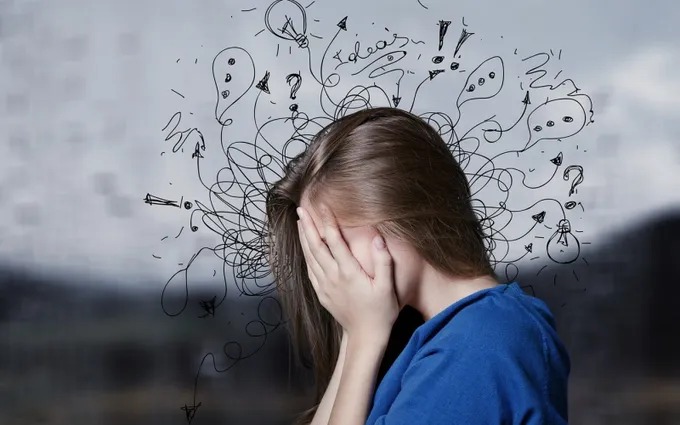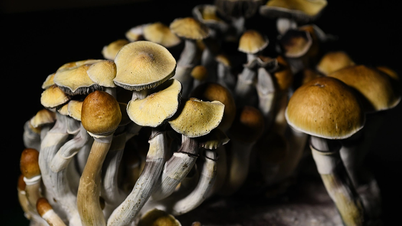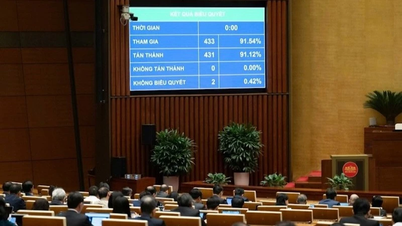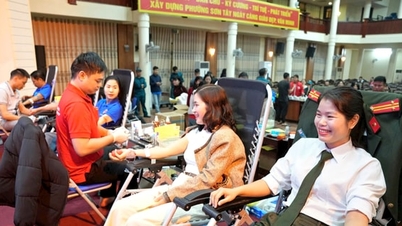More than 50% of patients coming for mental health check-ups at Bach Mai Hospital were diagnosed with anxiety disorders. This is an alarm bell showing that parents need to pay attention to their children's health.
According to specialist doctor II Nguyen Hoang Yen, Deputy Head of the Department of Child and Adolescent Psychiatry, Institute of Mental Health, Bach Mai Hospital, factors affecting anxiety disorders in children include cognitive and learning factors; biological and neurological factors; genetic factors and social and environmental factors.
 |
| More than 50% of patients coming for mental health check-ups at the National Children's Hospital were diagnosed with anxiety disorders. This is an alarm bell showing that parents need to pay attention to their children's health. |
For children between the ages of 2 and 5, if they often show signs such as showing little expression when faced with novelty; lack of smiles, little talking; little interaction; limited eye contact; slow to become friendly with strangers or children of the same age; not ready to explore new situations, etc.
These children may be 2-4 times more likely to suffer from anxiety disorders than other children. Dr. Le Cong Thien, Institute of Mental Health, Deputy Head of the Department of Psychiatry, Hanoi Medical University, said that more than 50% of patients coming for mental health examination at Bach Mai Hospital were diagnosed with anxiety disorders.
Many patients said they were always stressed and tired because of the lack of connection and the children felt lonely in the family. For example, before the child could speak or explain, the parents scolded, dominated, and did not listen to the child continue.
Dr. Nguyen Hoang Yen said that basically, anxiety is normal. But for some children, anxiety is prolonged, excessive, affects behavior and thinking, causes obstacles to learning, family and social relationships, so it is necessary to take the child to the doctor to examine and evaluate this condition.
Signs of anxiety disorders are often avoidance of academic and social activities, such as going to school, parties, camping… and a constant need for excessive or repeated reassurance at bedtime, school or fear of bad things happening.
Children will fall behind in school, due to lack of concentration in class or difficulty in completing tests within the allotted time.
Children with anxiety disorders may present with symptoms of headache, dizziness, difficulty swallowing, choking sensation, vomiting or nausea, chest pain, shortness of breath, stomach pain, numbness and tingling in the fingers or toes due to rapid breathing or dramatic pain.
In particular, there is outbursts and oppositional behavior caused by an anxiety-provoking stimulus. Research shows that a significant proportion of children, those with weight problems or selective eating, report anxiety.
It is noteworthy that many studies have shown that anxious children may have suicidal thoughts. Other studies have found that suicidal ideation or behavior in anxious children is associated with hopelessness and depression.
Therefore, the most important thing is to detect the disease early and know where to treat it so that the child can be examined and consulted. Dr. Le Cong Thien said that if this disease is treated early, it will be very effective. Treatment can be done with medication, counseling and psychological therapy, and the child can be cured.
To prevent anxiety disorders in children, parents should adjust their children's activities and lifestyles; exercise regularly, about 30 minutes/day; eat nutritious foods; sleep on time, 8-10 hours/day depending on age; practice yoga or relax the mind;
Address anxiety-causing issues head-on; practice 4-phase relaxation breathing (inhale for 3 seconds, hold for 3 seconds, exhale for 3 seconds, hold for 3 seconds), improve stress-coping skills and social skills.
It is known that in recent years, the rate of depression in children tends to increase and become younger. The disease often has no clear signs and can cause many serious consequences to the child's later life.
According to a report by the United Nations Children's Fund (UNICEF) in Vietnam, the rate of general mental health problems in our country is 8% - 29% for children and adolescents.
An epidemiological survey conducted in 10 provinces in our country (reported by Weiss et al.), the rate of mental health problems in children is about 12%, equivalent to more than 3 million children with mental health needs. However, only about 20% of them receive medical support.
According to data reported by some other studies in Vietnam, the rate of adolescents with depression is 26.3%, children with thoughts of death is 6.3%, children planning suicide is 4.6%, children attempting suicide is 5.8% (according to Dr. Do Minh Loan, National Children's Hospital).
However, many parents do not realize this serious problem and do not detect the psychological abnormality of their children early. From there, the child's depression becomes more and more serious.
Other studies have shown that about 7% of children suffer from anxiety and about 3% suffer from depression between the ages of 3 and 17. The risk of depression and anxiety tends to increase as children get older, between the ages of 12 and 17.
Depression in children can have many different symptoms, so it is easy to confuse it with normal emotional and physical changes in children. The most typical signs of depression are feelings of sadness, hopelessness, and social withdrawal.
Source: https://baodautu.vn/tre-mac-roi-loan-lo-au-tang-cha-me-can-lam-gi-d223219.html


















































































































Comment (0)